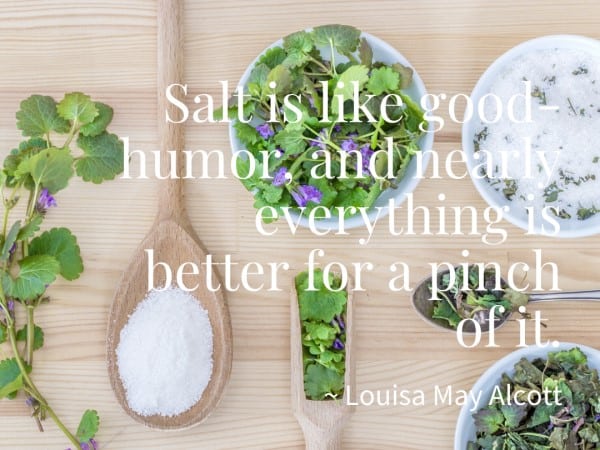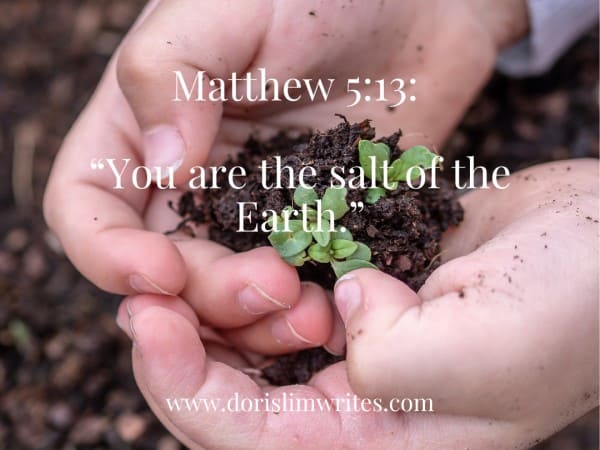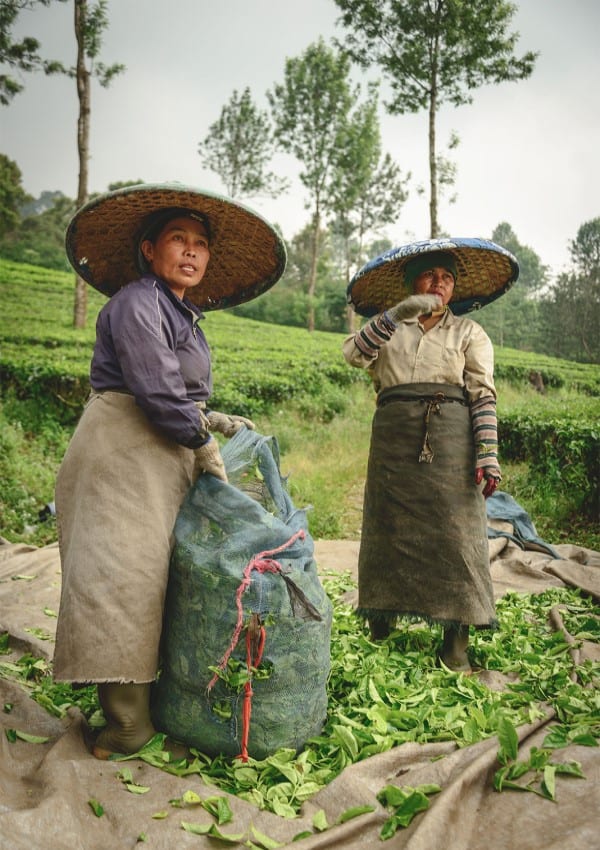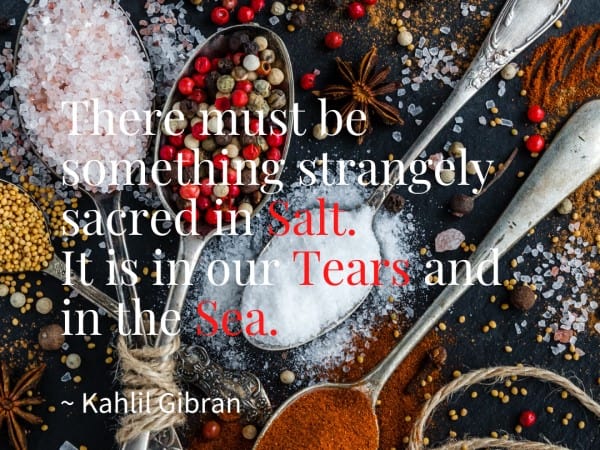The Story of Salt & Other Gratitude Stories
I have been thinking about the story of salt and other stories I have encountered.
There are hundreds of varieties of salt worldwide to satisfy those curious about this vital ingredient.
Salt and gratitude are essential for human life; we can taste the saltiness. Gratitude is heartfelt and changes lives.
Salt is essential, although harmful when consumed in large quantities. It is the only mineral that humans consume as nourishment.
Salt is an ingredient that enhances the flavor of food and even desserts.
If you love salt like me, you will know that salt is used extensively in areas other than food.
From legends and religions to migrations and wars has been used for centuries – Salt is a precious and rare ingredient.
Even more so, is Gratitude.
A grain of salt can change the flavor, so does heartfelt gratitude.
 The cure for anything is saltwater – sweat, tears, or the sea. ~ Isak Dinesen
The cure for anything is saltwater – sweat, tears, or the sea. ~ Isak Dinesen
Other Gratitude Stories
When I started writing, I recall that the stories of salt are actually stories of gratitude, and this has become my Gratitude Journal.
The Story of Salt – Carrot Cake with Salt Cream Cheese Frosting
The first time Ben bought something from his home to the office – we were surprised.
IMPRESSED.
Pat nudged me and whispered loudly, “He bakes!!!”
“Of course. Baking is just science,” I said.
UNIMPRESSED.
“But it’s carrot cake.”
“Which tasted like wilted strands of coconut.”
“But you like coconut.”
“I like coconut water.”
“But there’s Cream Cheese Frosting.”
“I prefer shaved Parmesan cheese onto pasta and risotto, meatballs, and Caesar salad.”
“Why don’t you like him?”
“Why do you like him.”
Pat shrugged and went to chat Ben up.
She couldn’t understand why I was so unimpressed.
I didn’t tell her that I also baked.
Baking is just science.
Measure the dry ingredients accurately.
Follow the instructions to the tee.
What could go wrong?
Ben forgot that grain of salt in the cream cheese frosting.
He said he created the recipe himself.
There was no gratitude in any way, shape, or form shown.
But that is just Ben.
The Story of Salt – What could go wrong?
Using salt instead of sugar is one.
One day I helped Geri baked. Of course, it had to be coincidentally a Carrot Cake with Cream Cheese Frosting.
It was for her 21st birthday.
I have two BIG weaknesses when it comes to baking.
Hard to count this as TWO – it feels like a few hundred.
- She can’t measure accurately.
- She has a nasty habit of opening the oven to peek at the cake.
So, I was tasked with whipping the cream cheese for the frosting.
I put in salt instead of sugar.
Geri never spoke to me again.
“And every offering of your grain offering you shall season with salt; you shall not allow the salt of your God’s covenant to be lacking from your grain offering. With all your offerings, you shall offer salt.” Leviticus 2:13

The Story of Salt – Curry Noodles with Sugar Broth.
I used to eat at the same noodle shop every day for almost a year.
I love the convenience, and I’m boring when it comes to food.
There’s no hard and fast rule about eating.
At the Noodle Shop, the rules are simple.
Mr. Goh makes the Curry Noodles.
Mrs. Goh makes the Poached Chicken.
The rest of us (read customers) eat, pay, and come back every day.
It was a sure-fire way for a successful Chinese business.
The Chinese are simple, straightforward people.
My biggest Chinese trait?
I like to do business, and I’m not too fond of gossip and small talk.
Neysa told me that the owner of the shop she goes to for meals makes too many comments.
The woman owner commented on her dress.
She commented on her friends.
The owner woman commented when Neysa’s friends paid for her food.
The solution: Just eat at a Chinese-operated eating shop.
You come in.
They nod.
You nod.
They bring the food out.
Hot, consistently good.
You eat.
You pay.
You come back tomorrow.
Repeat.
No other suggestion is needed.
No warmth.
No apathy.

The Story of Salt – Chinese Businesses
I told Neysa that I ate at Mr. and Mrs. Goh’s restaurant/café/Kopitiam/canteen every day for two meals for the year I worked next door.
You got to eat at a Chinese operated business.
No one makes any suggestions or comments.
It’s just like that.
That’s the way it goes.
Until one morning at breakfast.
I looked at Mr. Goh, yawning like a Hippopotamus in his corner.
“Why did you make a syrup soup for the Curry Noodles? What’s wrong with you?”
“No, what’s wrong with YOU, Aunty?”
I pursed my lips.
I collected all the half and empty soya sauce containers from all the tables in his restaurant/café/Kopitiam/canteen.
I plopped that on the counter where Mr. Goh serves his Curry Noodles.
“Twenty bowls and my regulars didn’t say a WORD.”
“Well, Mr. Goh, you run a Chinese-operated restaurant/café/Kopitiam/canteen.
The customers eat quietly, pay, and leave clues for you.”
“I overslept. I must have put sugar instead of Salt in the Curry Broth.”
No suspicious explanations either.
Needless to say no sense of gratitude from Mr. Goh.
Perhaps his customers deliberated not to tell anything rather than face a resolution of conflicting emotions.
The Story of Salt – I didn’t marry for the disparity.
Budi, my friend’s Indonesian maid, is 4′ -10″.
Her lack of height has always impacted her outlook toward gratitude.
One day, she said, “I show a family photo. Sisters”
There was a photo with that unmistakable grin.
She was standing next to two younger women.
Both women reached her shoulder.
Budi looked like a giant.
“You are Giant (Raksasa).”
“Me, no big. They are very small.”
Budi found work in Medan, at the bustling wet market.
She met her husband Mas, a lorry driver there.
They dated and decided to marry.
Both have a balanced outlook when it comes to marriage.
Budi said simply, “he is a man, hard-working, have a job.”
The Story of Salt and Black Tea
Budi journeyed to her husband’s home in West Java’s hills – home of the tea plantations.
The actual reality of the much-loved brew, the Tea that is produced comes at a high cost to the tea farmers – unfair wages, malnutrition, and high maternal mortality.
At home, plantation workers often drink salted black tea, like we would a cup of coffee.
In the 19th century, colonizers would give laborers salted black tea to help replace the essential salts lost through dehydration.
A cup of salted black tea is what many tea plantation families drink for energy.
Something they have been doing for generations to counter symptoms of low
- blood sodium
- weakness
- fatigue or low-energy
- headache
- nausea
- vomiting
- muscle cramps or spasms
- confusion
- irritability

Each generation born on the plantations produces the next batch of laborers; drinking salted tea has become a daily habit.
Family members who don’t work in the fields also drink copious hot cups of salted tea.
The entire family were farmers and eked out a living planting tea leaves.
The smallholders in West Java and West Sumatra have small plots of land—infertile ground located in remote locations.
- Faced with so many limitations, the generation of farmers continues to live in harsh conditions.
- The farmers find it hard to improve their livelihoods, productivity, and limited access to international markets.
- Limited technical knowledge
- Poor farming practices
- No logistics of getting leaf to factories in good time and condition
- Lack of working capital (e.g., fertilizers, new tea bushes)
The Story of Salt and Gratitude – Budi
Budi recounted her wedding.
She was shocked that they had so little.
They had a gruel made from corn with bitter tea berries and fried shaved coconut with salt for the wedding feast.
The star dish was RICE!
The farmers were so poor that they could not afford to buy rice and salt.
They could grow some corn for their daily sustenance.
When they have enough money, they will travel to town to buy rice and salt.
Budi continued planning for her trip home as she cooked lunch.
“I buy rice, many packets. Pay motor (motorcycle rider) driver to send to family.”
“Buy salt, salted fish, oil.”
“I give something good for food.”
She grinned at the happy memory in the midst of challenging times.
I shared in Budi’s enthusiastic holiday feelings.
I reached for the salt container.
She held it up and stared at the white grains of salt.
I put it back and handed Budi the Soya Sauce.
“Use this.”
Source: THE STORY OF SALT AND ITS DIFFERENT VARIETIES





